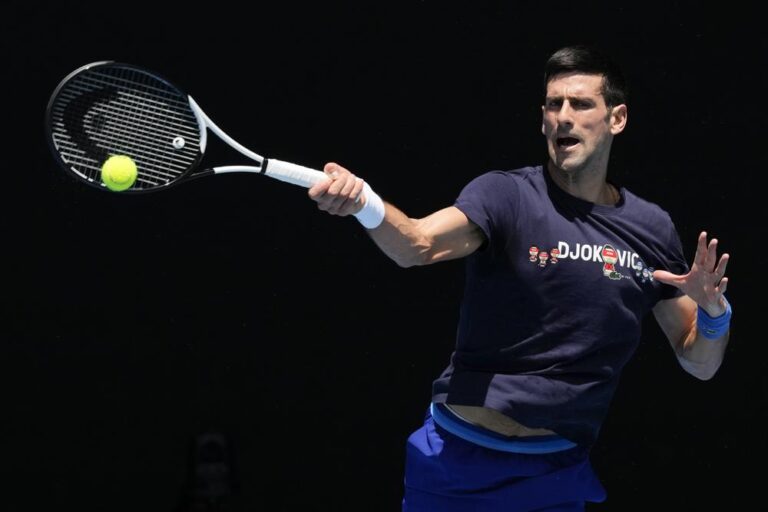
MELBOURNE, Australia (AP) — Novak Djokovic knew he’d tested positive for COVID-19 when he attended a newspaper interview and photo shoot at his tennis center in Serbia last month, saying Wednesday he made an “error of judgment” and should have immediately gone into isolation.
Djokovic made the admission when he moved to clarify “ongoing misinformation” about his movements after he tested positive last month. He also blamed “human error” by his support team for a mistake on the travel document he used a week ago to enter Australia, where his visa was revoked and then reinstated in a COVID-19 vaccination saga that has overshadowed the days leading up to the Australian Open.
A statement was posted on Djokovic’s social media accounts while the men’s tennis No. 1 was in Rod Laver Arena holding a practice session, his third on the tournament’s main court since being released from immigration detention.
The nine-time and defending Australian Open champion is in limbo before the year’s first tennis major starts next Monday, a week after he won a legal battle allowing him to stay in the country.But he still faces the prospect of deportation because he’s not vaccinated for COVID-19, a decision entirely at the discretion of Australia’s immigration minister if deemed to be in the public interest for health and safety reasons. Deportation could result in sanctions ranging up to a three-year ban from entering Australia, a daunting prospect for a player who has won almost half of his record-equaling 20 Grand Slam singles titles here.
Court documents detailing Djokovic’s positive test sparked speculation over the star player’s attendance at events in his native Serbia last month. Further questions also were raised about errors on his immigration form that could potentially result in the cancellation of his visa.
On the form, Djokovic said he had not traveled in the 14 days before his flight to Australia, despite being seen in Spain and Serbia in that two-week period.Djokovic described recent commentary as “hurtful” and said he wanted to address it in the interest of “alleviating broader concern in the community about my presence in Australia.”
The 34-year-old Serb said he’d taken rapid tests that were negative and he was asymptomatic before he received his positive result from an approved PRC test he undertook out of an “abundance of caution” after attending a basketball game in Belgrade on Dec. 14.
He received the result late Dec. 17, he said, and scrapped all his commitments except the long-standing interview with L’Equipe.
“I felt obligated to go ahead … but did ensure I socially distanced and wore a mask except when my photograph was being taken,” Djokovic said. “While I went home after the interview to isolate for the required period, on reflection, this was an error of judgment.”
He addressed the travel declaration by saying it was submitted by his support team and “my agent sincerely apologizes for the administrative mistake in ticking the incorrect box.”
“This was a human error and certainly not deliberate,” he wrote. “The team has provided additional information to the Australian Government to clarify this matter.”
The decision could take a while, although the draw to determine brackets for the Australian Open is set to take place Thursday. Immigration Minister Alex Hawke’s office issued a statement saying Djokovic’s legal team had filed further documents against the the potential cancellation of his visa and added: “Naturally, this will affect the timeframe for a decision.”
At issue is whether he has a valid exemption to rules requiring vaccination to enter Australia since he recently recovered from COVID-19.
Panels backed by the Victoria state government and Tennis Australia approved his request for a medical exemption based on his having tested positive for the coronavirus in the past six months. The Australian Border Force rejected his exemption and canceled his visa, sending him into immigration detention for four nights before a judge in the Federal Circuit Court overturned the decision on procedural grounds.
He was among the 26 people who applied for a medical exemption, and Tennis Australia said only a “handful” were granted. Subsequent investigations resulted in two other people involved in the sport leaving the country.
There’s growing concern in the community, meanwhile, with COVID-19 cases surging.
Victoria state, whose capital Melbourne is hosting the Australian Open starting next week, reported 21 deaths Wednesday along with 40,127 new cases.
Australia-based lawyer Greg Barns, who is experienced in visa cases, told The Associated Press that if the immigration minister does take action, he could choose to simply cancel Djokovic’s visa or give the tennis star notice of his intention to cancel it.
Barns said Hawke has the “personal power” to cancel the visa without having to give written notice or a reasonable time for Djokovic to respond.
If Djokovic’s visa is canceled, his lawyers could go back to court to apply for an injunction that would prevent him from being forced to leave the country.
If the government does issue a notice of intent, Barns said it could give Djokovic up to nine days to respond, depending on when he receives it.
“That might be a way of giving Djokovic a chance in the tournament and then kicking him out at the end of that,” Barns said. “In my experience, it’s relatively rare for them to change their mind.”
Sydney-based immigration lawyer Simon Jeans said there’s “a lot of fudges” in the law and the immigration department would be taking its time to make sure any visa cancellation was “appeal-proof.”






